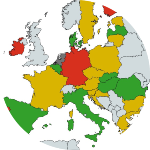
Best of 2021: Top 10 ECF news articles
A round up of our most-read articles in 2021, including stories of successful advocacy, news from ECF Members, emerging trends in cycling and highlights from across the cycling world.
2022 is almost upon us and with the holiday period now here, let’s take this opportunity to reflect on the events of the past year! 2021 was an eventful year for cycling advocacy as the world sought to recover and rebuild from the impact of the COVID-19 pandemic.
The new decade, though off to a rocky start, certainly holds a lot of promise for more cycling for all and a quick glance at our most read news items from the past year paint an undeniably positive picture going forward for cycling in Europe and beyond. The ten most read news items show what committed advocacy looks like, how successive campaigns build upon one another and the results of such efforts paying off.
1. “Commission’s strongest commitment to cycling to date”: Cycling organisations react to the “Efficient and Green Mobility” package

The end of the year was marked by a massive win for the European cycling community as the European Commission made its strongest commitment to cycling yet. Commission Executive Vice-President Frans Timmermans stated that “the new urban mobility framework specifies in detail how cities are going to increase zero-emission public transport roll out more and better infrastructure for walking and cycling, and green the cars,” with the whole package setting European mobility “on track for a sustainable future.” The new green package will ensure that cycling take-up is encouraged as a priority at both local and national levels alongside public transport and walking.
Read the full article here.
2. EPBD: Mandatory bicycle parking in all new and renovated buildings will make cycling easier for millions of Europeans
 Earlier this month, a major victory was achieved for cyclists at the EU level. The Commission released its revised guidelines for the Energy Performance of Buildings Directive that aims to ensure new buildings and renovations meet minimum standards with regards to energy efficiency. ECF had called for the links between housing and mobility to be extended beyond simply e-vehicle charging points and to include provisions specifically for cycling as the most energy-efficient mode of transport. The end result was a real cause for celebration as all new buildings will now be mandated to have a minimum of two secure bicycle parking spots.
Earlier this month, a major victory was achieved for cyclists at the EU level. The Commission released its revised guidelines for the Energy Performance of Buildings Directive that aims to ensure new buildings and renovations meet minimum standards with regards to energy efficiency. ECF had called for the links between housing and mobility to be extended beyond simply e-vehicle charging points and to include provisions specifically for cycling as the most energy-efficient mode of transport. The end result was a real cause for celebration as all new buildings will now be mandated to have a minimum of two secure bicycle parking spots.
Read the full article here.
3. EU member states are neglecting cycling in post-pandemic recovery plans

In April 2021, new analysis by the European Cyclists’ Federation (ECF) of EU member states’ National Recovery and Resilience Plans(NRRPs) submitted to the European Commission showed that only six were properly using their plans to seize upon the enormous recovery potential of cycling. ECF Director of Advocacy and EU Affairs Fabian Küster reported that doubling cycling levels could create more than 1 million cycling-related jobs in Europe. Cycling advocates from across Europe called upon governments to recognise the role cycling has played thus far in combatting the pandemic and boosting a green recovery.
Read the full article here.
4. If you build it, they will come: New study shows impact of COVID-19 cycling infrastructure

There is a strong relationship between cycling infrastructure and behavioural change. A study based on data from ECF’s COVID-19 cycling measures tracker showed that cities with governments that invested in cycling infrastructure saw corresponding growth in the cycling modal share. Director of Intellectual Property and Data collection, Holger Haubold, reported that pop-up bicycle lanes themselves generated between 11% and 48% additional cycle traffic from March to July 2020. The findings served to underline the calls being made for cycling’s inclusion within the evolving NRRP discussions taking place at the time.
Read the full article here.
5. Lessons learned: Building a regional cycling network in Poland’s West Pomerania region
Over the course of 2021, ECF sought to highlight specific examples of success stories from within the European cycling world. One such lesson came from Poland, where an extensive cycling network has been taking shape in a relatively short space of time. We explored the best practices taken up in the region of West Pomerania that enabled the creation of 800km of high-quality-cycle routes and a network spanning an entire region.
Read the full article here.
6. The decade of the bicycle
The 2020’s got off to an undoubtedly rocky start and the world continues to work to overcome the COVID-19 pandemic. Nevertheless, there have been undeniably positive changes taking place within our society and chief among these is without doubt the increased take up of cycling in cities across the world. ECF President Henk Swarttouw, writing back in June for World Bicycle Day, laid out the case for the bicycle being the solution to many of society’s persistent challenges and stating that the 2020’s will be when transport is no longer seen as part of the problem but rather as part of the solution.
Read the full article here.
7. Historic milestone: 54 countries adopt the Pan-European Master Plan for Cycling Promotion

The Pan-European Master Plan for Cycling Promotion was adopted on 18 May 2021 as part of the Vienna Declaration, it was the first officially adopted supra-national document on cycling policy transcending the EU. The plan laid out the ambitious goal of doubling cycling levels within the 54 participating countries by 2030. ECF President Henk Swarttouw commented that “We at the European Cyclists’ Federation are proud to have been contributing to the development of this Master Plan from the beginning. I promise we will stay engaged during the implementation phase, remaining a constructive partner while keeping a watchful eye”.
Read the full article here.
8. Cargo bikes on the rise: Reimagining city logistics

In April, the first article in our cargo bike series shone a spotlight on the rapidly expanding micro-logistics industry seeking to alleviate the pressures arising from urban freight. It is estimated that a whopping 50% of all urban freight trips could be replaced by the humble cargo bike, a figure that is less surprising when the majority of light-goods vehicles are rarely, if ever, loaded to capacity. With the growth in e-commerce putting strain on our city streets, the need for innovative alternatives and new urban logistics models is more urgent than ever.
Read the full article here.
9. How much does a cycle track cost?

With so many “coronapistes” being established and discussions around temporary cycle infrastructure being made permanent in cities across Europe; we asked ourselves what information do local cycling advocates and city officials need when making these decisions? Our resident infrastructure expert, Policy Officer Aleksander Buczynski thankfully stepped in to provide critical insight into the cost effectiveness of varying levels of cycling infrastructure. These years of experience were then compiled into an ECF factsheet, The Costs of Cycling Infrastructure, which allows for easy access to the relevant technical information.
Read the full article here.
10. The European Parliament calls for taking cycling into account in the TEN-T guidelines

Just this month, the European Commission published its revised guidelines for the TEN-T transport infrastructure network. However, ECF began calling for cycling’s inclusion way back in January of 2021 with two key demands to recognise the EuroVelo network within the TEN-T network and to integrate cycling into individual TEN-T projects. Our campaign to ensure cycling secures its rightful place within the TEN-T as the most sustainable mode of transport continues. Our latest reaction to the Commission’s revised guidelines can be found here.
Read the full article here.
Regions:
Contact the author
Recent news!
Upcoming events
Contact Us
Avenue des Arts, 7-8
Postal address: Rue de la Charité, 22
1210 Brussels, Belgium











